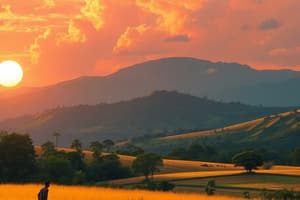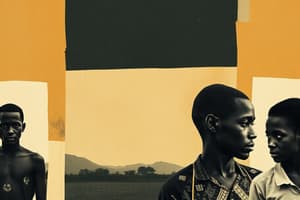Podcast
Questions and Answers
What was the primary purpose of the gacaca courts established in Rwanda in 2002?
What was the primary purpose of the gacaca courts established in Rwanda in 2002?
- To speed up the justice process for genocide-related cases (correct)
- To facilitate international legal proceedings
- To punish high-ranking officials for genocide
- To provide educational programs for the public
What was a major consequence of the apartheid system in South Africa?
What was a major consequence of the apartheid system in South Africa?
- Segregated living areas based on racial classification (correct)
- Neutral economic policies affecting all races equally
- Increased voting rights for black citizens
- Forced racial integration in schools and workplaces
How did the South African government respond to the resistance against apartheid in the 1970s and 1980s?
How did the South African government respond to the resistance against apartheid in the 1970s and 1980s?
- By encouraging international support for the protesters
- By banning protest organizations and imprisoning their leaders (correct)
- By reducing discriminatory laws against black citizens
- By lifting restrictions on protest organizations
What classification system was implemented in South Africa to enforce apartheid?
What classification system was implemented in South Africa to enforce apartheid?
What significant event occurred during the student protests in Soweto on June 16, 1976?
What significant event occurred during the student protests in Soweto on June 16, 1976?
What were the two main indigenous groups in Rwanda before the scramble for Africa?
What were the two main indigenous groups in Rwanda before the scramble for Africa?
How did German colonizers perceive the Tutsi population?
How did German colonizers perceive the Tutsi population?
What was a significant effect of colonial rule on Rwandan society?
What was a significant effect of colonial rule on Rwandan society?
What event in 1994 triggered the mass killings in Rwanda?
What event in 1994 triggered the mass killings in Rwanda?
What was the role of the United Nations peacekeepers during the Rwandan genocide?
What was the role of the United Nations peacekeepers during the Rwandan genocide?
What occurred after Belgium left Rwanda in 1962?
What occurred after Belgium left Rwanda in 1962?
What was a consequence of the peace agreement signed in 1993?
What was a consequence of the peace agreement signed in 1993?
What prompted Hutu militants to conduct mass killings during the genocide?
What prompted Hutu militants to conduct mass killings during the genocide?
What was the purpose of the gacaca courts established in Rwanda in 2002?
What was the purpose of the gacaca courts established in Rwanda in 2002?
How did apartheid affect the classification of citizens in South Africa?
How did apartheid affect the classification of citizens in South Africa?
What event marked the large student protests in Soweto in June 1976?
What event marked the large student protests in Soweto in June 1976?
What was one of the main responses of the South African government to the resistance against apartheid in the 1970s and 1980s?
What was one of the main responses of the South African government to the resistance against apartheid in the 1970s and 1980s?
Which colonial powers were most influential in South Africa's history?
Which colonial powers were most influential in South Africa's history?
What was the population ratio between Hutus and Tutsis prior to the scramble for Africa?
What was the population ratio between Hutus and Tutsis prior to the scramble for Africa?
Which group did German colonizers favor during their rule in Rwanda?
Which group did German colonizers favor during their rule in Rwanda?
What was a significant action taken by Belgium after taking control of Rwanda?
What was a significant action taken by Belgium after taking control of Rwanda?
What sparked the genocide in Rwanda in 1994?
What sparked the genocide in Rwanda in 1994?
What was the role of the United Nations in Rwanda during the genocide?
What was the role of the United Nations in Rwanda during the genocide?
What was a consequence of the 1993 peace agreement between Hutus and Tutsis?
What was a consequence of the 1993 peace agreement between Hutus and Tutsis?
What percentage of the Rwandan population was affected by the genocide, according to estimates?
What percentage of the Rwandan population was affected by the genocide, according to estimates?
Which group primarily fled to neighboring countries during the violence following the Hutus gaining power?
Which group primarily fled to neighboring countries during the violence following the Hutus gaining power?
Flashcards
Apartheid
Apartheid
A system of racial segregation and discrimination enforced by law in South Africa from 1948 to 1991.
International Criminal Tribunal for Rwanda (ICTR)
International Criminal Tribunal for Rwanda (ICTR)
The United Nations court established in 1994 to try high-ranking Rwandan officials accused of genocide, war crimes, and crimes against humanity.
Gacaca Courts
Gacaca Courts
Local courts established in Rwanda in 2002 to expedite the process of trying individuals accused of participating in the Rwandan genocide.
Soweto Uprising
Soweto Uprising
Signup and view all the flashcards
Justice and Reconciliation
Justice and Reconciliation
Signup and view all the flashcards
Scramble for Africa
Scramble for Africa
Signup and view all the flashcards
Colonialism
Colonialism
Signup and view all the flashcards
Ethnic Divisions in Rwanda
Ethnic Divisions in Rwanda
Signup and view all the flashcards
Ethnocentrism
Ethnocentrism
Signup and view all the flashcards
Rwandan Genocide
Rwandan Genocide
Signup and view all the flashcards
Genocide
Genocide
Signup and view all the flashcards
Incitement
Incitement
Signup and view all the flashcards
International Community's Response to Genocide
International Community's Response to Genocide
Signup and view all the flashcards
UN Response to the Genocide
UN Response to the Genocide
Signup and view all the flashcards



